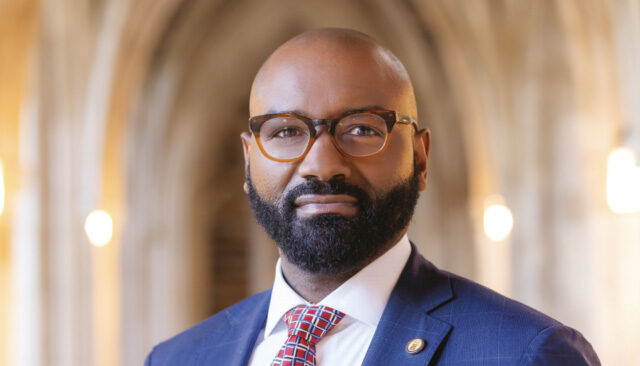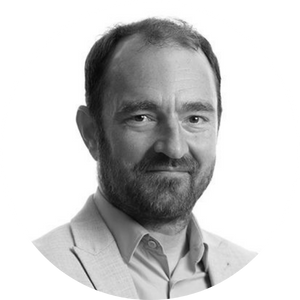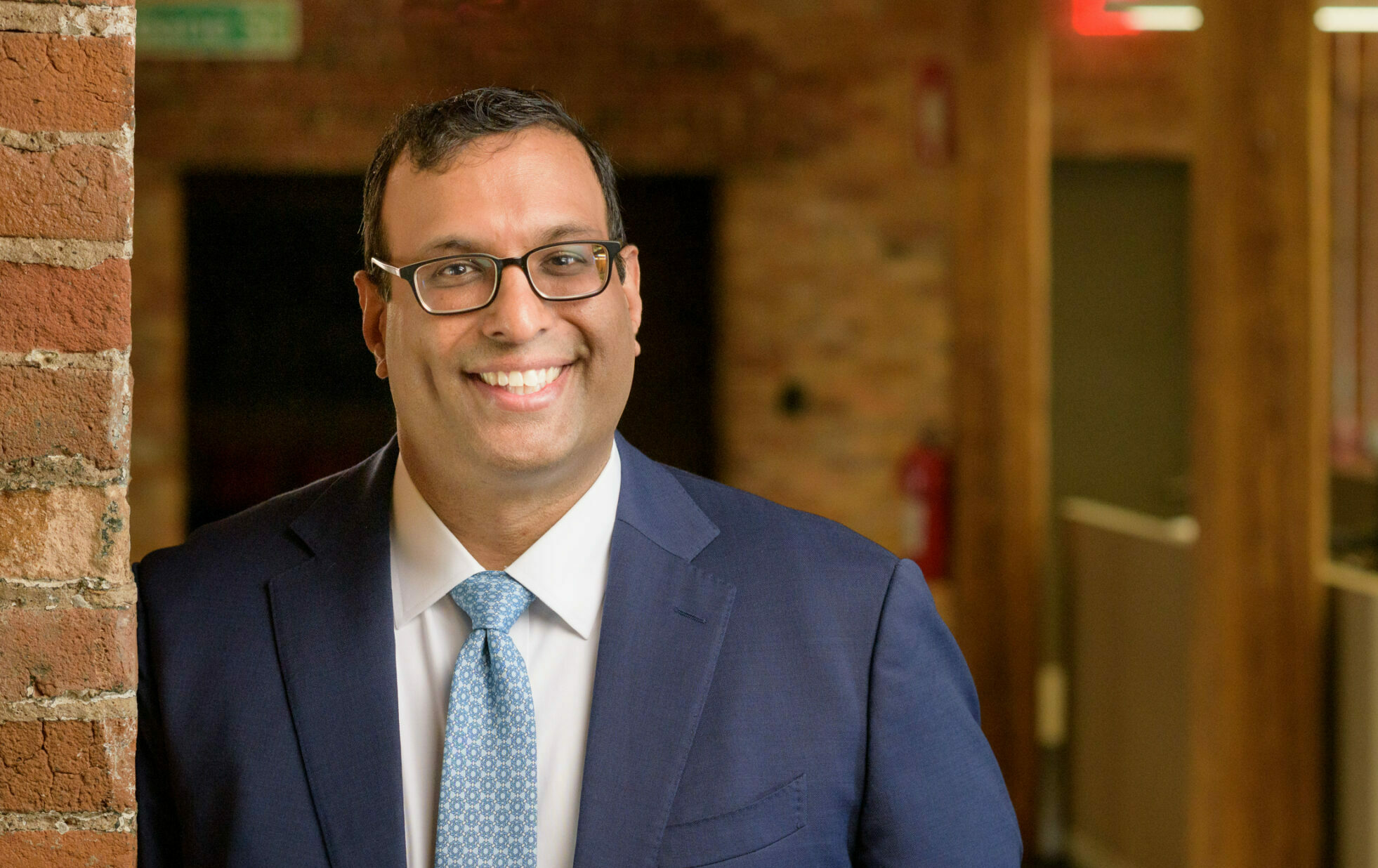Antwan Lofton creates space for difference.
When he was just 19 years of age, something happened to Antwan Lofton that would shape his whole career.
Lofton, newly appointed vice-president for human resources at Duke University, remembers applying for an internship and travelling to New York to interview for the role. While he waited patiently for his turn, he chatted to the receptionist. “I had nowhere to sit and, being the extrovert I am, I just decided to spark up conversation with the lady at the front desk,” recalls Lofton. “She asked me, where did I see myself in five years? I was sharing with her my career goals and all the things that I wanted to do with my life. And we were laughing and talking – it must have been 20 minutes or more – just having a great conversation while I waited for my turn.”
But Lofton’s turn never came. “A gentleman walked out of the boardroom and announced that they had made their selections for the internship, and they were not seeing any other people that day,” Lofton recalls. “So, there I was in New York and thinking, ‘Okay, well, there it is. I didn’t get it.’”
He brushed it off as best he could and continued his conversation with the receptionist, asking her the quickest route to the airport so he could catch a flight home. “Even more intently, she leaned in and wanted to learn and know more about me,” recalls Lofton. “I didn’t realize it then, but now it makes sense.”
As he went to leave, the receptionist called him back. She handed him a lunch ticket: “She said, ‘You came a long way. And there is a gentleman that will probably join you in the restaurant. Just go in. I’ve so enjoyed our conversation.’”
At that point, Lofton’s life changed. “Sure enough, at lunch, a gentleman walks over and sits down and shakes my hand. And we just start laughing, talking about life. I tell him my aspirations. Then, towards the end of the conversation, he says, ‘you got the position’.”
Lofton’s companion was the firm’s president. He had planned to have lunch with the receptionist, who was leaving the company, to thank her for her service. The president told Lofton: “She gave up her lunch with me because she saw something in you.”
By the time Lofton eventually emerged from his conversation with the president, the receptionist had gone. They never met again. “I’ve tried numerous times to find her,” he recalls, “to thank her for what she did.”
Unable to pass the thanks back, Lofton passes it forwards. “I made a vow to myself. Any door that I have been fortunate enough to walk through, I don’t close that door behind me,” he says. “I want to make sure that I leave that door ajar so someone else can walk through it. It may be a faceless person, a nameless person that I may never know. But if I create a shape or space that makes it easier for the next person to win an opportunity… that’s my way of saying thank you.”
Different vantage points
That word – opportunity – crops up a lot when you are speaking to Lofton. It seems to form his whole being. A career that began with that fairytale of New York, continued through years of service in the US health system, latterly into academia, with Howard University and now Duke. Throughout it all, he reveals, he has been studiously present: there to hear what employees are saying, building a three-dimensional image of the organization.
“If I work in human resources, I must be an actual human resource,” he says. “If our people view me, or the offices that I represent, as solely transactional, they’re not going to come to me. I want to get to know everyone at every level, where they feel comfortable coming to me, even if it’s an area that’s not fully within my purview. People are often shocked: ‘What? Why did they go to you about that?’ The answer is because I make myself available for them to sit and to talk.
“I am always trying to figure out ways to best serve our people, as well as looking at ways to make everyone feel whole. If you’re going to make policies, if you’re going to update procedures, come up with a strategic plan, you need to position yourself so you understand how that plan is going to affect the capital, the fundraising efforts, the costs, but also consider how it is going to touch lives – patients, students, employees, faculty or staff. What is the implication of your plan going to have on all of those kinds of lives?”
Lofton recalls a 2008 film starring Dennis Quaid and Forest Whitaker called Vantage Point, in which an attempted assassination of the US President is told from the view of eight eyewitnesses. I hadn’t seen the picture, so streamed it the evening after I met Lofton. The movie uses a cinematographic technique called the Rashomon effect, which explores the known phenomenon of eyewitness inconsistency. The point of the screenplay is that it is impossible to build an accurate representation of an event without combining the experiences of multiple individuals.
“The entire movie centres around everyone telling the story as it relates to what they saw – but from where they were standing,” says Lofton. “And everyone has a totally different story, based upon their vantage point. I am always interested in bringing thought-leaders into the workforce that may not necessarily have the same lived experiences that I have.”
He makes himself available out of hours, whenever people want to speak to him. “I believe in doing impromptu surveys where you just go out and ask questions,” he says. “If there’s a town hall meeting, or a new announcement that was rolled out at 8am, by 11.30am I’m walking the halls asking people, ‘so how did that meeting go this morning?’ ‘That memo that went out from the president: how do you see your role playing a part in it?’ So people understand that they are a part of every decision that is made within the university or the health system. But here’s the other element. People working lates or nights shouldn’t be left out and asked to visit some non-existent waiting room where their opinions can theoretically be heard. I’ll show up on the weekend. I’ll show up at two o’clock in the morning and ask the staff working at night.”
Different people, different times, different vantage points: “I’ll say to the late shift, ‘did you hear about that announcement that went out this morning at 8am, because I realize you weren’t working at that time?’ And in many cases they’ll say, ‘yeah, I read that policy. However, it’s not applicable to us and this is why… boom, boom, boom…’ or, ‘we’ve seen several things rolled out that really only impact people who work during the day.’”
As the great economist John Maynard Keynes advised, when the evidence changes, Lofton changes his mind. “Make sure that when you hear those things you can say, ‘possibly we missed the mark,’” he says. “I have no problem admitting when I’m wrong. We should not be afraid to say when we miss the mark. Live it. Fix it!”
It is this multidimensional, agile approach to employee relations that has led Lofton to become a renowned expert in the field. He rejects my suggestion that he has some sort of ethereal gift for it, citing instead a formula of communication, accessibility, and endowment.
“I really wish there was this magical term that I could use to make it sound as if I had an enchanted touch or that what I do is somehow so special,” he says. I suggest he is downplaying his own abilities; underestimating his achievements: “I’m just successful at something that should be a very simplistic truth known by any leader,” he says. “And that is that everyone wants to feel seen, heard – and valued.”
The art of developing people
Healthcare is heavily unionized. The cost-of-living crisis has triggered industrial action, both in his country and mine. Yet Lofton says that focusing solely on salaries is a mistake.
“If you are looking at the labour markets and how unions work, the number one reason that individuals give is that they need to be represented,” he says. “People automatically think it’s about wages. When people say, ‘I need someone to represent me’, what they are actually saying is, ‘I do not feel seen, I do not feel heard, therefore, I do not feel valued – so I’m looking for someone – via a mediator; via a union – to come be my voice.’”
Lofton’s appointment at Duke represents something of a homecoming. He was born not at Duke University Hospital, but at the facility of its neighbour and archrival – the University of North Carolina Medical Center. “I was born under the lighter shade of blue!” he says, alluding to the colour associated with the university. But the hue swiftly changed. “I had difficulties breathing independently,” Lofton recalls. “And so, immediately after birth, I was rushed to this place with its darker shade of blue. It was Duke University Hospital that gave me the tools to breathe independently. I find it hilarious that I am back at the institution that gave me my second wind of life.”
I feel sure that he will maximize the opportunity, for himself and others. His approach to diversity is to increase the talent pool: ensure that the widest breadth of people and ideas come through that metaphorical door that was opened to him all those years ago in Manhattan. “It’s not all about changing who is hired, because we want the best candidate to be hired, that’s the number one,” he says. “But the goal is to widen that applicant pool, to make sure that it’s very diverse. Some people are shocked to hear this, but it’s the truth: there are certain career paths that are more driven by certain individuals. There are certain positions that are male-dominated; there are certain positions that are female-dominant. It’s also about educating our senior leaders and ensuring they are aware of what those paths look like.”
Lofton is so outgoing and determined, I wonder if he struggles to delegate. “That’s a very good question,” he says. “I do love to be able to see how a project is moving along. But I try not to micromanage, because while it may be easier to get involved – because it’s something that you’ve done for years, and you could just jump in and tell someone the best way to do it – sometimes the teachable moment comes from walking back and allowing them to figure it out. And then when they come to you and say, ‘this isn’t working’, then it’s at that point that the dialogue really helps.”
Maybe that’s an overlooked art of developing people. Timing. Lofton composes great teams because he lets people find their own way. He shudders at the idea of identikit recruitment. “While I was listening to you phrase that statement, it instantly formed a question in my mind,” he says. “Could I imagine working with ten people that were identical to me?”
So could he? “I don’t think so!” he says. “There’s so much value to being with someone that can introduce a new topic, hold a different opinion, or has lived a different experience to your own.”





